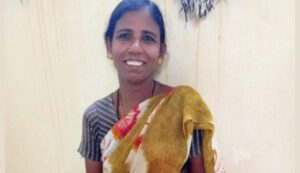Satyanarayanamma: How a polio-disabled fisherwoman overcame social barriers to lead her community to a cleaner, healthier future
Satyanarayanamma: Open defecation used to be the norm in Ponnapalli ward, Narsapur town, Andhra Pradesh, where slum households lacked access to basic sanitation. Despite these difficulties, Satyanarayanamma, a mother of two and a fisherwoman with polio disability, overcame societal norms and used her tenacity and will to guide her community toward a better, cleaner future.

Personal Motivation
Satyanarayanamma’s path to being a change agent started with her personal polio ordeal, which left her disabled. Because of her experience, she realized how crucial good hygiene is to avoiding disease. She realized that her family and the community as a whole were at risk due to improper sanitation procedures. Her personal connection to cleanliness and health inspired her to act.
When Satyanarayanamma joined the Gender Forum, a local NGO that promotes sanitation and hygiene education, she discovered her platform for change. She made friends with other ladies who shared her interest for improving the Ponnapalli ward’s living circumstances here. Collectively, they endeavored to increase awareness about vital matters like feminine hygiene, the significance of utilizing restrooms, and the advantages of consistent hand washing.
Satyanarayanamma was first met with opposition from the community in spite of her efforts. It was difficult to persuade the locals to stop open defecating and embrace better hygiene habits. Many people were hesitant to break firmly rooted routines. But the Gender Forum’s backing and Satyanarayanamma’s leadership gradually changed the tide. Their regular faecal sludge management talks and sanitation audits started addressing the community’s issues and opening the door for change.
Reaching the Status of Open Defecation Free (ODF)
Ponnapalli ward reached an important milestone by working tirelessly to become Open Defecation Free (ODF). This success not only raised locals’ standards of health and cleanliness, but it also served as a model for neighboring Narsapur wards. Satyanarayanamma’s leadership played a pivotal role in this accomplishment, demonstrating that community-driven transformation is achievable.
The success of Ponnapalli’s sanitation efforts was in line with the larger national initiatives of the Swabhav Swachhata Sanskaar Swachhata (4S) campaign, which was initiated to commemorate the Swachh Bharat Mission’s tenth anniversary. This program, which runs from September 17 to October 2, 2024, keeps bringing attention to India’s dedication to sustainable sanitation and cleanliness. Narratives such as Satyanarayanamma’s embodie the essence of the Swachh Bharat Mission, motivating people all throughout the nation to take charge of their own cleanliness and health.
The Swachh Bharat Mission’s effects
The outstanding accomplishments of the Swachh Bharat Mission demonstrate India’s progress toward a healthier and cleaner future. More than 4,500 Indian cities are open defecation free as of September 2024, and many have advanced beyond basic sanitation to get ODF+ and ODF++ designations. More than 5.5 lakh rural communities with better sanitation practices and amenities have been designated as ODF Plus. These achievements show not just the growth of the infrastructure but also a change in the way people think, which Satyanarayanamma has contributed to in the Ponnapalli ward.
Maintaining the Flow for Upcoming Generations
The accomplishments of community-based initiatives like Satyanarayanamma’s guarantee that communities are not only provided with toilets but also with the knowledge and accountability to uphold cleanliness for many years to come, as the Swachh Bharat Mission enters its second decade. Her work is a potent illustration of how a single person’s resolve may spur group action and result in long-lasting change.
The tale of Satyanarayanamma serves as a reminder that real transformation involves more than simply constructing new infrastructure; it also entails changing public perceptions about cleanliness and sanitation. Her activities in the Ponnapalli ward show how community-driven projects may be effective in producing long-lasting results. The people of Ponnapalli have improved their living circumstances and left a legacy of responsibility that will help future generations by taking charge of their health and environment.
Satyanarayanamma has shown by her transformation from a fisherwoman to a community leader that one person’s tenacity can result in the prosperity of a whole community. Her experience serves as evidence of the value of local leadership in India’s larger campaign for sanitation and public health.

